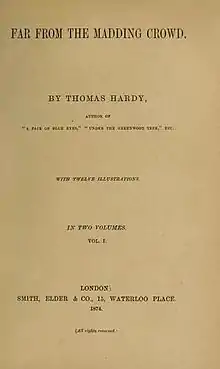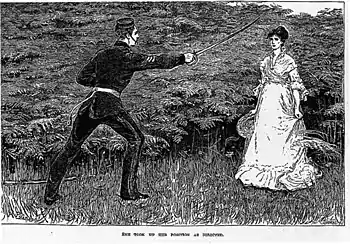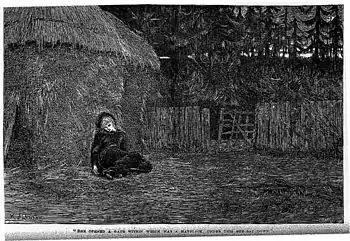Çılgın Kalabalıktan Uzak
Çılgın Kalabalıktan Uzak orijinal adıyla Far from the Madding Crowd Thomas Hardy'nin 1874 yılında yayımlanan dördüncü romanı ve en büyük edebi başarısı. Kitap Cornhill Magazine ‘de anonim olarak ve aylık bir seri şeklinde yayımlanmıştır, bu sayede büyük okuyucu kitlelerine ulaşmıştır. Kitap yayımlandığı dönemde çoğunlukla olumlu eleştiriler almıştır. Hardy 1895 baskısında kitaba eklemeler yapmış; 1901 baskısında ise kitap üzerinde düzenlemeler yapmıştır.[1]
| Far from the Madding Crowd | ||||
 Kitanın 1874 yılındaki ilk baskısının ön sayfası. | ||||
| Yazar | Thomas Hardy | |||
|---|---|---|---|---|
| Çevirmen | Nihal Yeğinobalı | |||
| Ülke | İngiltere | |||
| Dil | İngilizce | |||
| Tür | Psikolojik dram | |||
| Yayım | 1874 | |||
| Seri | ||||
| ||||
Özet
Gabriel Oak genç bir çiftçidir. Sade yaşam biçimi sayesinde biriktirdikleriyle bir koyun çiftliği kurmuştur. Gabriel, teyzesi Bayan Hurts'ün yanında yaşamak için köyüne gelen kendinden altı yaş küçük Bathsheba Everdene 'e aşık olur. Zamanla Bathsheba ve Gabriel tanışıklıklarını ilerletirler, hatta Bathsheba Gabriel'in hayatını bile kurtarır. Ancak Gabriel ona evlenme teklif ettiğinde Bathsheba onu reddeder çünkü kendi bağımsızlığına olan ihtiyacı, Gabriel'e duyduğu sevgiden büyüktür. İhanete uğramış ve mahcup hisseden Gabriel, onu görmeyi keser. Birkaç gün sonra ise Bathsheba yakınlardaki başka bir köy olan Weatherbury'ye taşınır.
Birbirlerini bir sonraki görüşlerinde, ikisi içinde durumlar dramatik bir şekilde değişmiştir. Tecrübesiz çoban köpeği George, Gabriel'in sürüsünü uçurumdan aşağı sürmüş ve onu mahvetmiştir. Bunun üzerine borçlarını ödeyebilmek için değerli olan her şeyini satan Gabriel, beş parasız kalmıştır. Gabriel Casterbridge şehrinde kendine iş aramış ancak burada iş bulamayınca, Weatherbury'den sadece on mil uzakta olan Shottsford şehrine gitmek üzere yola çıkmıştır. Bu yolculuk sırasında, bir çiftlikte çıkan büyük bir yangın görmüş ve onu söndürmek için durup yerlilere yardım etmiştir. Çiftliğin yüzü örtülü sahibi ona teşekkür etmeye geldiğinde, Gabriel ona çiftlikte bir çobana ihtiyacı olup olmadığını sorar. Çiftlik sahibi yüzündeki örtüyü çıkarır ve böylece onun Bathsheba olduğu anlaşılır. Bathsheba'ya amcasından büyük bir miras ve bu mirasın içinde yer alan bu çiftlik kalmıştır. Bu konu hakkında farklı duyguları olan Bathsheba, Gabriel'i işe alır.
Bathsheba'in ve Boldwood
Artık Bathsheba'nın yeni bir hayranı vardır: yalnız ve depresif William Boldwood. Boldwood kırklı yaşlarında varlıklı bir çiftçidir. Meanwhile, Bathsheba has a new admirer: the lonely and repressed William Boldwood. Boldwood is a prosperous farmer of about 40, whose ardour Bathsheba unwittingly awakens when – her curiosity piqued because he has never bestowed on her the customary admiring glance – she playfully sends him a valentine sealed with red wax on which she has embossed the words, "Marry me". Boldwood, not realising the valentine was a jest, becomes obsessed with Bathsheba and soon proposes marriage. Although she does not love him, she toys with the idea of accepting his offer; he is, after all, the most eligible bachelor in the district. However, she postpones giving him a definite answer. When Gabriel rebukes her for her thoughtlessness, she fires him.
Çiftlikteki bir kuzu Gastrik dilatasyon volvulus'tan muzdarip olunca, Bathsheba bu hastalığı tedavi edebilecek tek kişi olan Gabriel'ı çağırır. Geri dönmeye ikna olmayan Gabriel'i ikna etmek için, Bathsheba gururunu bir kenara bırakıp yardım etmesi için ona yalvarır. Bu olaydan sonra ikilinin arkadaşlıkları düzelir ve Bathsheba'a Gabriel'e eski işini teklif eder.
Sergeant Troy returns

At this point, the dashing Sergeant Francis "Frank" Troy returns to his native Weatherbury and by chance encounters Bathsheba one night. Her initial dislike turns to infatuation after he excites her with a private display of swordsmanship. Gabriel observes Bathsheba's interest in the young soldier and tries to discourage it, telling her she would be better off marrying Boldwood. Boldwood becomes aggressive towards Troy, and Bathsheba goes to Bath to prevent Troy returning to Weatherbury, as she fears Troy may be harmed on meeting Boldwood. On their return, Boldwood offers his rival a large bribe to give up Bathsheba. Troy pretends to consider the offer, then scornfully announces they are already married. Boldwood withdraws humiliated and vows revenge.
Bathsheba soon discovers that her new husband is an improvident gambler with little interest in farming. Worse, she begins to suspect that he does not love her. In fact, Troy's heart belongs to her former servant, Fanny Robin. Before meeting Bathsheba, Troy had promised to marry Fanny; on the wedding day, however, the luckless girl went to the wrong church. She explained her mistake, but Troy, humiliated at being left waiting at the altar, angrily called off the wedding. When they parted, unbeknownst to Troy, Fanny was pregnant with his child.
Fanny Robin

Some months later, Troy and Bathsheba encounter Fanny on the road, destitute, as she painfully makes her way toward the Casterbridge workhouse. Troy sends his wife onward with the horse and gig before she can recognise the girl, then gives Fanny all the money in his pocket, telling her he will give her more in a few days. Fanny uses up the last of her strength to reach her destination. A few hours later, she dies in childbirth, along with the baby. Mother and child are then placed in a coffin and sent home to Weatherbury for interment. Gabriel, who has long known of Troy's relationship with Fanny, tries to conceal the child's existence – but Bathsheba agrees for the coffin to be left in her house overnight, from her sense of duty towards a former servant of the household.[2] Her new servant, Liddy, repeats the rumour that Fanny had a child and so, when all the servants are in bed, Bathsheba unscrews the lid and sees the two bodies inside – her husband's former lover and their child.
Troy then comes home from Casterbridge, where he had gone to keep his appointment with Fanny. Seeing the reason for her failure to meet him, he gently kisses the corpse and tells the anguished Bathsheba, "This woman is more to me, dead as she is, than ever you were, or are, or can be". The next day he spends all his money on a marble tombstone with the inscription: "Erected by Francis Troy in beloved memory of Fanny Robin..." Then, loathing himself and unable to bear Bathsheba's company, he leaves. After a long walk he bathes in the sea, leaving his clothes on the beach. A strong current carries him away, but he is rescued by a rowing boat.
Climax
A year later, with Troy presumed drowned, Boldwood renews his suit. Burdened with guilt over the pain she has caused him, Bathsheba reluctantly consents to marry him in six years, long enough to have Troy declared dead.
Troy, however, is not dead. When he learns that Boldwood is again courting Bathsheba, he returns to Weatherbury on Christmas Eve to claim his wife. He goes to Boldwood's house, where a party is under way, and orders Bathsheba to come with him; when she shrinks back in surprise, he seizes her arm, and she screams. At this, Boldwood shoots Troy dead and tries unsuccessfully to turn the gun on himself. Although Boldwood is condemned to hang for murder, his friends petition the Home Secretary for mercy, citing insanity. This is granted, and Boldwood's sentence is changed to "confinement during Her Majesty's pleasure". Bathsheba, profoundly chastened by guilt and grief, buries her husband in the same grave as Fanny and their child, and adds a suitable inscription.
Ending
Throughout her tribulations, Bathsheba comes to rely increasingly on her oldest and, as she admits to herself, only real friend, Gabriel. When he gives notice that he is leaving her employ, she realises how important he has become to her well-being. That night, she goes alone to visit him in his cottage, to find out why he is deserting her. Pressed, he reluctantly reveals that it is because people have been injuring her good name by gossiping that he wants to marry her. She exclaims that it is "...too absurd – too soon – to think of, by far!" He bitterly agrees that it is absurd, but when she corrects him, saying that it is only "too soon", he is emboldened to ask once again for her hand in marriage. She accepts, and the two are quietly wed.
Türkçe Basımları
- Çılgın Kalabalıktan Uzak, çevirmen: Nihal Yeğinobalı, Can Yayınları.
- Çılgın Kalabalıktan Uzak, çevirmen: Soner Yılmaz, Oda Yayınları.
- Çılgın Kalabalıktan Uzak, çevirmen: Ayşe Türkmen, Altın Post Yayıncılık.
Kaynakça
- Page, Norman, (Ed.) (2000). Oxford Reader's Companion to Hardy. Oxford: Oxford University Press. ss. 130-132.
- Higonnet, Margaret R., (Ed.) (1992). Feminist essays on Hardy : the Janus face of gender. Urbana: University of Illinois Press. s. 59. ISBN 0252019407.